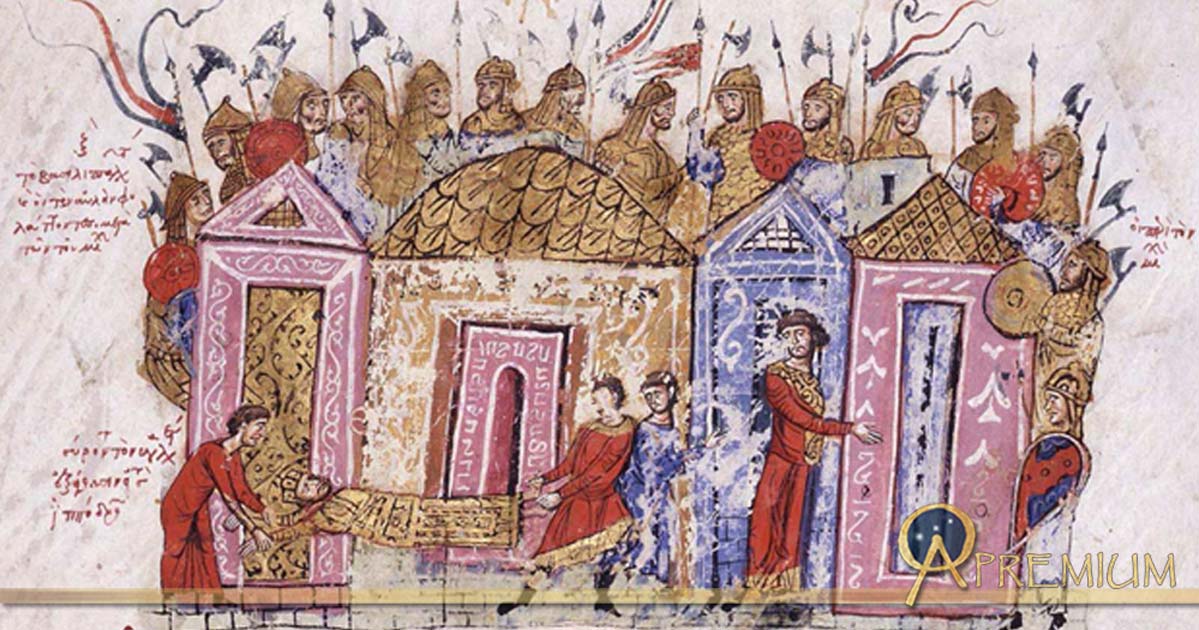The Varangian Guard: Elite Byzantine Warrior Merchants
The Varangians were an elite guard that once served as the personal bodyguards of Byzantine emperors. When not protecting the emperor, they served at the frontlines in times of war to protect and expand the borders of the Byzantine Empire. But who were these Varangians, where did they come from, and when were they established? The earliest recorders pertaining to presence of Norse warriors at the imperial court at Constantinople, came about during the reign of Emperor Theophilus (829 – 842 AD). The city of Cherson in the North Sea region found itself threatened by Norsemen and implored the Byzantine Empire to send reinforcements to defend it. The Norse chieftains decided to accept peace and to form alliances with the imperial Byzantine court, for the Norsemen grasped the commercial and military enterprise of such a relationship. However, that relationship would not become viable until 874 AD.

Byzantine emperor Theophilus (829 - 842 AD), on horseback. Chronicle of John Skylitzes 13th Century (Public Domain)
Origins of the Varangians
The Varangians were originally Swedish merchants who entered eastern Russia. The name Varangian, which is disputed, comes from the Russian Varyag or the Greek Varangoi in Byzantine sources. The meaning of the word pertains to "member of a sworn brotherhood," and its origins are believed to be Old Icelandic. As for the word Rus, or Ruotsi in Balto-Finnish, it means Sweden. However, rodr is Swedish/Old Norse, meaning a "crew of oarsmen."
The 10th century Arab traveler, Ibn Fadlan, gives a brief description of the Rus: “I saw the Rus folk when they arrived on their reading mission and settled at the river Atul (Volga). Never had I seen a people of more perfect physiques. They are tall as date-palms, and reddish in color. They wear neither coat nor kaftan, but each man carried a cape which covers one half of his body, leaving one hand free. No one is ever parted from his axe, sword, and knife...”
However, the word and meaning of Varangian comes with a caveat. While at first it denotes a group of people who are originally from Scandinavia, it becomes a rather generic term. As the decades and centuries passed, the term Varangian could be applied to anyone of a non-Scandinavian origin, such as mercenaries looking to profit from the coffers of the Byzantine imperial court
Like this Preview and want to read on? You can! JOIN US THERE ( with easy, instant access ) and see what you’re missing!! All Premium articles are available in full, with immediate access.
For the price of a cup of coffee, you get this and all the other great benefits at Ancient Origins Premium. And - each time you support AO Premium, you support independent thought and writing.
Cam Rea is an author and military historian. He has written numerous articles for Ancient Origins, Classical Wisdom Weekly, and has authored several books, including: The Wars of Israel: A Military History of Ancient Israel from the End of Judges to Solomon
Top Image: Varangian Guard .Chronicle of John Skylitzes 13th Century (Public Domain)
By Cam Rea




















